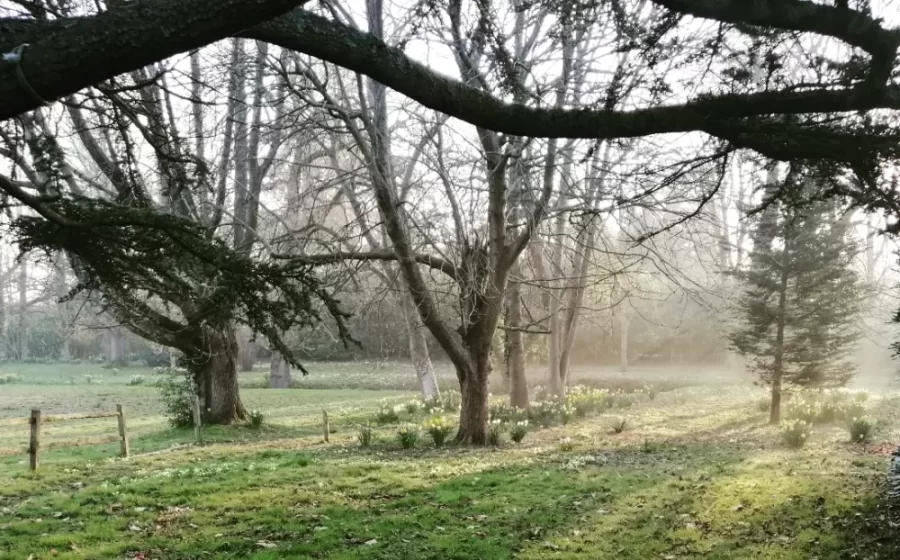Ahem
Our dogs have not been well. Both Bonnie and Max have suffered from stomach trouble, but Bonnie stopped eating and drinking and her temperature soared while she walked around in a dehydrated and discombobulated daze. There were rumours of a dog virus around the walkers’ slopes of Batchelors’ Farm. She was referred by the vet to a specialist urgency clinic in Brighton (calling itself ‘The Priory’) for testing and overnight care. The next day after supervision she was better, much to everyone’s relief, although she still gets confused on walks. Max has started to step up to the plate, as the Americans say, and is providing more leadership, for example by wolfing down Bonnie’s dinner whenever he gets the chance and no one is looking.
My birthday was a surprise. I hadn’t forgotten it but our family is so collectively addicted to surprises that I was expecting one, especially as no one mentioned anything for weeks before except to remind me to keep the day free. Came the 6th, I was invited to a full turn-out of my daughters and their partners at the old-style New Inn in Hurstpierpoint. Ella and Gwen had roast pumpkin and I had roast celeriac (which was very tasty indeed). Only two of us had alcohol (I’m still practising temperance); there were no starters and just three puddings between us all. We went back to Ella and Sam’s house where Alli joined us and I opened typically thoughtful cards and presents. A week later I was enjoying Jessie’s present – a visit to Brighton’s Theatre Royal to see the UK’s ‘Glenn Miller Orchestra’ as faithfully recreated by veteran Scottish bandleader Ray McVay. I had always liked ‘swing’ music although it is as severely date-stamped as a sepia print in a broken frame. The audience consisted mostly of people of my age and their more aged parents. Even the oldest of the audience could not possibly have seen Glenn Miller in his heyday when he was regularly top of the pops, but there was some decorous and careful dancing in the aisles. Ray seemed unsteady on his feet and in speech despite a heavy Scots accent, but he was also gently humorous and knew his audience well. A week later I was enjoying Ella’s birthday present: comedian and journalist Matt Chorley at the Komedia. It was an excellent show, consisting of Chorley roundly ridiculing the current government with well-practised fluency and assurance. Unfortunately, Jessie and Gwen were taken ill, so could not come.
I spent a long overdue couple of days in the warm hospitality of friends Peggy and Robin in Oxford. The excuse for the visit and the stay was to attend a reunion dinner at the Dragon School as one of the class of 1970. This was a bittersweet curate’s egg. I was happy to see a few people, especially many of the teachers from that era, but I confess that I found myself avoiding a few other less savoury contemporaries. I had earlier met up with best mate Charlie from my year. We walked around Woodstock together after meeting on a blasted heath of unforgiving gig-economy motels policed by computers and video cameras, set on a traffic-cone roundabout on the northern city limits of Oxford. Woodstock was packed tight and piled high with stupid cars and even the Marlborough/Vanderbilt pile was charging a tenner just to walk around its grounds. None of this improved my state of mind but it calmed as I walked back from the school that night into the welcome of a civilised hearth and intelligent conversation with my hosts. The rest of the weekend recalled a more easily remembered past – a sunlit walk around Jericho and north Oxford, now less shabby and more chic, a towpath meander along the canal, garlanded with willow, flowering cherry and grandiloquent magnolia; a mannered visit to my old English teacher Harryhopper (Mike), several stimulating chats about moral philosophy, neuroscience, poetry, religion, the classical languages, and a magical visit to the Saint Sepulchre graveyard just around the corner.
Back home, I had previously received a legal summons to attend court, and so I complied by performing my civic duty of jury service for ten days at Lewes Crown Court. Expecting to deliberate on a couple of shifty shoplifters or perhaps a lockdown party in Downing Street, I was ambushed and overwhelmed by a 60-year old story of family division, suspicion, duty, and subservience. All of this was smothered in a deep generational curtain of silence about sex crimes committed regularly for months by a 15-year old boy on his twin step-sisters aged nine, lying together in a double bed. The trial (a re-trial) was a culmination, unfurling over six decades, of charges pressed last year by the twins, now 70 years old, against the predatory boy-bully of 1961, now a feeble old man at 75 with a hearing aid. It kept turning itself off, as if even this minor contraption found the testimonies too unpalatable for it to function on his behalf. The trial was highly unusual and somehow detective-story literate in its detail. There were dramatic elements: was a sombre note on a cheery Christmas card blackmail? (a major clue being that it was opened not by the accused but by his wife; the infant portrayal of a Grimm-wicked step-mother; whether identical twins were telepathic; PC plod police incompetence; and over it all the intense psychological conundrum for most witnesses of calling to mind the detail of such incidents and their impacts over sixty years ago.
The traditional jury system for criminal cases is good for justice and equity of course, but even better for keeping public sensitivities aware of the simple and brutal realities of crime, judgment, and punishment – light years away from the absurd, addictive fictions of screen entertainment and false-shock tabloid headlines. I have now lost any taste I ever had for psycho-dramas involving children because the real thing as recounted by real people is grossly under-rated and a thousand times more frightening. I shall also never agree that criminal cases are too difficult for the general public to understand. The judge and the counsel did their jobs impeccably, each insisting upon clarity and precision. The police witness did not: lying to the defence counsel and almost scuppering the trial with his incompetence. My randomly picked co-jurors were insightful, informed, thoughtful, and intelligent to a person. I was glad that I had at last taken part in the process of one of the only traditional British institutions in which I still have some pride. Bref, I helped to get justice done, and I am
yours in awe of the law,
Lionel






